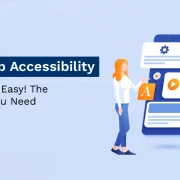SCORM (Sharable Content Object Reference Model) is a set of technical standards for e-learning software products. It dictates how online learning content and Learning Management Systems (LMS) communicate, ensuring interoperability and reusability. Essentially, SCORM allows your training content to be easily shared and tracked across different platforms, making it a foundational element for effective and measurable online training programs. Understanding SCORM is crucial for businesses looking to deliver consistent and trackable e-learning experiences.
What is SCORM?
SCORM, which stands for Sharable Content Object Reference Model, is a set of technical standards for e-learning software products. Think of it as a common language that allows different e-learning platforms and content to communicate effectively.
At its core, SCORM defines how online learning content should be packaged, delivered, and tracked. It ensures that e-learning courses can be easily transferred between different Learning Management Systems (LMS) without compatibility issues. This “shareability” is the cornerstone of the SCORM standard.
Key benefits of using SCORM:
- Interoperability: Courses created to SCORM standards can run on any SCORM-compliant LMS.
- Reusability: Learning content can be used across multiple courses and platforms, saving time and resources.
- Durability: Content remains usable even when the LMS is upgraded or changed.
- Accessibility: SCORM promotes consistency in content delivery, making it easier for learners to access and navigate courses.
SCORM packages learning content into a standardized format, including a manifest file that describes the course structure and learning objectives. When a learner interacts with a SCORM-compliant course, the LMS tracks their progress, including scores, time spent, and completion status. This data provides valuable insights into learner performance and course effectiveness.
In essence, SCORM ensures that your e-learning content is portable, trackable, and reusable across various learning environments, making it a widely adopted standard in the industry.
Why is SCORM important?
SCORM (Sharable Content Object Reference Model) is vital for e-learning due to its ability to standardize online learning content, making it reusable, interoperable, and easily trackable. Its importance stems from several key benefits:
Interoperability: SCORM ensures that e-learning courses developed with compliant authoring tools can run on any SCORM-compliant Learning Management System (LMS) without modification. This “write once, run anywhere” capability saves time and resources, preventing vendor lock-in.
Reusability: Learning objects designed in a SCORM-compliant manner can be easily reused across different courses and platforms. This modularity promotes efficiency, reducing the need to create new content from scratch for every training initiative.
Trackability: SCORM allows for detailed tracking of learner progress. LMS systems can record data like completion status, scores, time spent, and interactions within the course. This data provides valuable insights into learner performance, helping organizations assess training effectiveness and identify areas for improvement.
Standardization: By adhering to a recognized standard, SCORM ensures consistency in e-learning content development. This streamlines the creation process and facilitates collaboration between different developers and organizations.
In essence, SCORM provides a framework that ensures a consistent, efficient, and measurable learning experience, benefiting both content creators and learners.
How Does SCORM Work?
SCORM (Sharable Content Object Reference Model) is a set of technical standards for eLearning software products. It governs how online learning content and Learning Management Systems (LMSs) communicate. Think of it as a common language that allows eLearning courses to play and track user progress consistently across different LMS platforms.
Here’s a breakdown of how SCORM works:
- Content Packaging: eLearning content, like a module or course, is packaged into a standardized ZIP file. This package contains all the necessary files (HTML, images, JavaScript, etc.) and a manifest file that describes the content’s structure and how it interacts with the LMS.
- Importing into LMS: The SCORM package is uploaded and imported into an LMS. The LMS reads the manifest file and understands the content’s organization and how to launch it.
- User Interaction: When a user launches the SCORM content from the LMS, the content communicates with the LMS using a standardized Application Programming Interface (API). This API allows the content to send data about the user’s progress, score, completion status, and other relevant information.
- Data Exchange: The SCORM content sends data to the LMS in a standardized format. The LMS then stores this data, allowing instructors and administrators to track student performance and completion rates. Typical data points include time spent in the module, quiz scores, pages viewed, and completion status (passed/failed, completed/incomplete).
- Reporting: The LMS uses the collected SCORM data to generate reports on learner activity and course effectiveness. This data helps instructors identify areas where students are struggling and improve the content accordingly.
Essentially, SCORM provides a reliable way for eLearning content to be delivered, tracked, and reported on within a compatible LMS, ensuring interoperability and consistent learning experiences.
SCORM in Action: Leading Brands Leveraging the Standard
SCORM (Sharable Content Object Reference Model) isn’t just a technical standard; it’s a practical tool empowering numerous leading brands to deliver and track effective e-learning. Here are examples of how it’s being used:
Corporate Training & Onboarding: Many Fortune 500 companies use SCORM-compliant Learning Management Systems (LMS) to deliver standardized training across global teams. Imagine a multinational retail chain using SCORM to train new employees on sales techniques and compliance procedures. All learning data, like completion rates and quiz scores, is centrally tracked within their LMS, providing valuable insights into training effectiveness.
Healthcare & Pharmaceutical Compliance: Highly regulated industries like healthcare rely heavily on SCORM. Pharmaceutical companies, for instance, often use SCORM-compliant modules to train sales representatives on new drug information and regulatory requirements. The ability to track user progress and ensure compliance is critical, and SCORM provides the audit trail necessary.
Higher Education & Skill Development: Universities and online learning platforms often leverage SCORM for consistent course delivery. A university might use SCORM to package interactive learning modules developed by different professors, ensuring compatibility across their chosen LMS. Similarly, companies offering professional development courses use SCORM to track learner engagement and issue certifications upon completion.
Government Agencies & Public Sector: Government agencies use SCORM for internal training and public awareness campaigns. This allows them to standardize content and track completion rates across diverse user groups. The standardization provided by SCORM also facilitates accessibility compliance.
In each of these cases, SCORM allows for consistent tracking of learner progress, ensuring accountability and providing data-driven insights for continuous improvement of e-learning initiatives.
Key Benefits of SCORM
SCORM (Sharable Content Object Reference Model) offers numerous advantages for organizations implementing e-learning programs. Its widespread adoption stems from its ability to standardize and streamline online learning experiences. Here’s a look at the key benefits:
- Interoperability: SCORM ensures that e-learning content created for one Learning Management System (LMS) can be used on any other SCORM-compliant LMS. This eliminates vendor lock-in and offers greater flexibility in choosing the right platform for your needs.
- Reusability: SCORM content is designed to be modular. Learning objects can be easily reused in different courses and learning paths, saving development time and resources. This ‘create once, use many’ approach maximizes content ROI.
- Accessibility: SCORM facilitates content accessibility by providing a standardized way to package and deliver learning materials. This allows learners to access courses anytime, anywhere, and on various devices, promoting a more flexible and convenient learning experience.
- Trackability: SCORM enables detailed tracking of learner progress and performance. It allows LMSs to record data like course completion, time spent, and quiz scores. This data provides valuable insights into learner engagement and effectiveness, allowing for continuous improvement of training programs.
- Standardization: By adhering to a widely accepted standard, SCORM simplifies the process of content creation, delivery, and management. This reduces complexity and costs associated with developing and deploying e-learning initiatives.
- Cost-Effectiveness: The reusability and interoperability features of SCORM lead to significant cost savings in the long run. Organizations can avoid redundant content development and easily adapt existing materials to new learning requirements.
In essence, SCORM fosters a more efficient, flexible, and trackable e-learning environment, ultimately contributing to improved learning outcomes and a better return on investment for training programs.
SCORM: Common Misconceptions
SCORM (Sharable Content Object Reference Model) is a set of technical standards for e-learning software products. Despite its widespread use, several misconceptions surround it. Understanding these can help you make informed decisions about your e-learning strategy.
Misconception 1: SCORM is a Learning Management System (LMS). SCORM isn’t a platform; it’s a standard. It defines how e-learning content and LMSs communicate. You still need an LMS to host and manage your SCORM-compliant courses.
Misconception 2: SCORM guarantees a great learning experience. SCORM ensures technical compatibility, not instructional quality. A SCORM-compliant course can still be poorly designed and ineffective. Focus on sound pedagogy alongside technical compliance.
Misconception 3: SCORM is the only e-learning standard. While widely adopted, SCORM isn’t the only option. Alternatives like xAPI (Experience API) offer more flexibility and capture a wider range of learning experiences beyond traditional LMS environments.
Misconception 4: SCORM is always the best choice. SCORM is suitable for tracking basic learning data (completion, score, time spent). However, for complex learning scenarios requiring detailed data or informal learning tracking, xAPI or other newer standards might be more appropriate.
Misconception 5: SCORM is easy to implement. While the standard is well-defined, implementing SCORM correctly can be complex, requiring technical expertise to ensure proper communication between the content and the LMS. Careful planning and testing are crucial.




